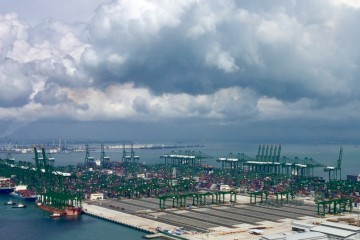Tomorrow the European Parliament will vote in a plenary session on the possible inclusion of shipping into the EU-ETS. For some MEPs this may sound like a technical issue, best resolved in close cooperation with industry lobbyists. However, what is at stake is something more fundamental: the social responsibility of a corporatist economic system. Put differently: a moral test of what should be expected from firms supported by the public sector.
Europe is hugely generous towards shipping. It allows countries to support their shipping sector with favourable tax regimes, exemptions from social security contributions and other forms of state aid. The subsidies can be substantial: in Germany, taxpayers have over 2003-2016 paid 4 billion euros in state aid to the shipping sector. But this is not all: shipping companies have been provided easy finance by specialised shipping banks, often state-owned, that now need government guarantees and bail-outs. Add to this public investments in port infrastructure and a range of adverse environmental impacts from shipping that generate public costs – e.g. health expenditures related to air pollution from ships and thousands of premature deaths per year. In some European countries taxpayers pay at least three times for facilitating exports via maritime trade.
So, despite rhetoric about free markets, shipping is in fact a highly assisted industry. “Free market” mostly refers to the wish to be free of regulation that the sector does not like. What is surprising is that the public authorities supporting shipping do not manage to impose certain standards that are trivially normal in other industries. Fourteen months after the historic Paris Climate Agreement, there is still no target or action plan for shipping – and a full-fledged plan is not expected before 2023. The IMO member states admittedly agreed to develop an initial strategy by 2018 (note the urgency) but this plan might at best only provide a partial solution, as the discussion on market-based mechanisms – such as a carbon tax – is tied a fuel data collection scheme that will only start in 2019. Also note that the IMO first started work on the climate impacts of shipping back in 2003.
In this context it is easy to understand the impatience of the environmental committee of the European Parliament that has proposed to include shipping in the EU Emissions Trading Scheme, one of the functioning market-based mechanisms to reduce carbon emissions. The proposal has been smartly designed: it applies to all ships calling EU ports, irrespective of their flags, there is an opt-out by way of establishing a Maritime Climate fund that would reduce administrative burdens and provide positive incentives for companies that want to innovate to reduce emissions.
Yet, ship-owners’ organisations in Europe have been lobbying vehemently against the proposal, using two arguments. The first argument is a classical mantra from the shipping lobbyist phrasebook: a global solution is needed for a global industry. The second argument: a European scheme would harm the prospects of a global solution. Both arguments are flawed. The proposal would apply to all flags, so does not disturb a level playing field in shipping. The only thing it does is somewhat increase the price of goods handled in EU ports, which will translate in a marginally higher cost of globally traded goods in Europe. If the proposal would double the costs of maritime transport (which it unfortunately does not do), the impact on goods value would still be minimal. But even that is beside the point, as the proposal clearly sets out that inclusion of shipping in EU-ETS would defer to any IMO agreement if established by 2023. So the proposal is foremost a means to keep some pressure on the global discussion. That the Secretary-General of the IMO has not welcomed the proposal as such, could be considered as proof that the environmental committee of the European Parliament was right to come up with the proposal.
Shipping lobbyists have been busy working on MEPs over the last weeks to avoid the proposal, almost with the same passion that is deployed to assure taxpayers money for shipping. Every parliamentarian obviously has his own political calculation to make. The ultimate question he might keep in mind when voting is this: how to explain to his voters that he just let a sector off the hook that is slurping up tax payers’ money?



